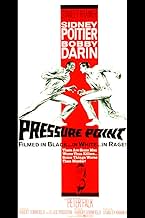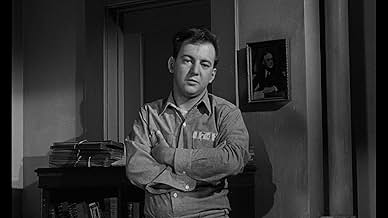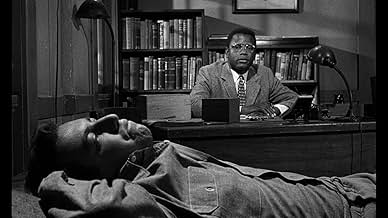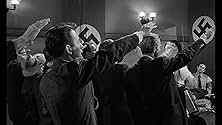Aggiungi una trama nella tua linguaA Black prison psychiatrist is assigned the distasteful task of helping a paranoid American Nazi charged with sedition.A Black prison psychiatrist is assigned the distasteful task of helping a paranoid American Nazi charged with sedition.A Black prison psychiatrist is assigned the distasteful task of helping a paranoid American Nazi charged with sedition.
- Regia
- Sceneggiatura
- Star
- Premi
- 1 candidatura in totale
- Father
- (non citato nei titoli originali)
- Bund Meeting Spectator
- (non citato nei titoli originali)
- Inmate
- (non citato nei titoli originali)
- Bund Meeting Spectator
- (non citato nei titoli originali)
- Patient
- (non citato nei titoli originali)
Recensioni in evidenza
I've heard "Mack the Knife" and other snappy songs by him, but I only recently realized that he was an actor as well. I'll admit that this was not a rented movie or something I sought out, just one that I caught from the classic channel, but it was from beginning to end, no commercials or cuts and I cannot express how much admiration I have for Bobby Darin. He came from a weird life (a life only Jack Nicholson could relate to) and add to that a disease that shortened it, but Bobby Darin made his time around one to be remembered. This man's performance in 'Pressure Point' stunned me.
Darin plays a man who's childhood was not one to be envious of. This man's life became even less envious, because the story takes place inside a prison where he is a convict. Sidney Poitier plays the prisons psychiatrist and Darin is sent to him because he cannot sleep due to anxiety. Poitier's character has a hard time with Darin's due to the fact that he is extremely racist (a Nazi even) and is continually treating Poitier as though he understands how he feels is wrong but doesn't care (that is the attitude that I got from it). That he knows everything he feels is based on a lie but he simply does not care...it allows him to be violent and hateful and that is why he does what he does. It's pretty scary and even though sometime you think, "goodness, I hate that sometimes what Darin's character is saying makes a little sense, what in the world is Poitier going to say to that?", that's when the doctor sets him straight.
I am a pretty emotional person and this movie really knows how to pull at them, even for an older movie, it has its 'I can't believe he said that' moments, but it was very impressive for Bobby and Sidney to do a movie with such a point, when others at the time were doing such cheesy things.
Twenty years back from the Civil Rights era, at its height when Pressure Point was made, back to World War II Poitier is a prison psychiatrist who gets one bad patient. It's Bobby Darin who had never been seen like this on film, as a racist punk who belongs to the German American Bund. Although Darin and his band of thugs have done some really violent crimes, some of which we see in flashback, it's for sedition that he's been arrested.
Still a recurring nightmare brings him to the couch in Poitier's office and the two of them develop a curious relationship. Darin pushes all of Poitier's buttons, in fact he's a pretty loathsome type. Curing his nightmares will not necessarily make him one that will socially adjust back in society.
Film Historians have called Poitier things like Saint Sidney for the heroic good roles he played back in the day as the first black leading man in mainstream films. He might just have qualified for it here, even more than in his film debut No Way Out dealing with another racist criminal Richard Widmark, that time as a medical doctor.
It was Darin who showed the acting chops here that were never displayed before. He was nominated for his performance as a Best Supporting Actor in Captain Newman, MD., personally I think this is his best screen work.
Pressure Point is a two person work, the rest of the cast merely serves as background figures. I'm wondering though why someone like Peter Falk consented to a role that's confined to two scenes at the beginning and the end with no real opportunity for him to display his talents. Still for fans of Poitier or Darin or both this is a chance to see them both at their best.
In 1942, the doctor is assigned to give psychiatric treatment and evaluate a dangerous American Nazi patient (Bobby Darin) accused of sedition. The racist patient has nightmares and insomnia and the doctor analyzes him along eighteen months, finding the reason of his disturbance. The patient convinces the board of direction that he deserves to be on probation but the doctor is reluctant and diagnoses that the patient has only resolved his sleeping problem but is still a despicable bigoted person.
"Pressure Point" is a theatrical film of intolerance and stress, dated in 2012, but nevertheless a great movie. I do not know how accurate is the psychiatric treatment, but the duel between Bobby Darin and Sidney Poitier is outstanding, both performing victims with strong characters – the patient, son of an abusive father that made him a bigot sadist and the doctor, a winner in a racist society. My vote is seven.
Title (Brazil): "Tormentos da Alma" ("Torments of the Soul")
The film is most impressive for its refusal to pander to an audience whose enjoyment might be enhanced if all the conflicts between the protagonists were resolved at the conclusion, but "Pressure Point" does not compromise its own integrity by pretending to provide easy answers to the questions it raises. Doctor and patient do not reach an understanding-- they do not embrace each other at the end, nor does the film suggest that society has benefitted from the encounter between two such disparate souls. Life simply goes on, and so do its troubles. "Pressure Point" makes its point subtly without a lot of sanctimonious preaching, and is more effective as a result.
The two stars are well matched with Poitier bringing his usual humanity and quiet pride to a role that does not place as much emphasis on his skin color as one would expect in a 1962 production. Darin is simply superb as Poitier's patient, and one can't help but admire the popular crooner for having had the courage to inhabit such an unappealing character at a time when he was still one of pop music's most prominent "teen idols" (and husband of America's sweetheart, Sandra Dee). The cinematography, music, and direction (by Hubert Cornfield) match the performances perfectly.
Lo sapevi?
- QuizProducer Stanley Kramer directed the framing story, which refers to the present-day story that Sidney Poitier tells to Peter Falk.
- BlooperThe calendar visible on the wall of the Doctor's office in 1942 is not correct for that year. (It would be correct for 1962.)
- Citazioni
Doctor: [angrily to the Patient] This is my country! This is where I've done what I've done, and if there were a million cruds like you, all sick like you are sick, all shouting, 'Down, destroy, degrade,' and if there were 20 million more sick enough to listen to them, you are still gonna lose! You're gonna lose, Mister, because there is something in this country, something so big, so strong that you don't even know... something big enough to take it from people like you and come back and nail you into the ground. You're walking out of here? You are going nowhere! Now get out!
- Colonne sonoreHere Comes the Bride
("The Bridal Chorus") (uncredited)
Composed by Richard Wagner (1850)
Sung at bund meeting
I più visti
- How long is Pressure Point?Powered by Alexa
Dettagli
Botteghino
- Budget
- 1.000.000 USD (previsto)
- Tempo di esecuzione1 ora 31 minuti
- Colore
- Mix di suoni
- Proporzioni
- 1.85 : 1
































